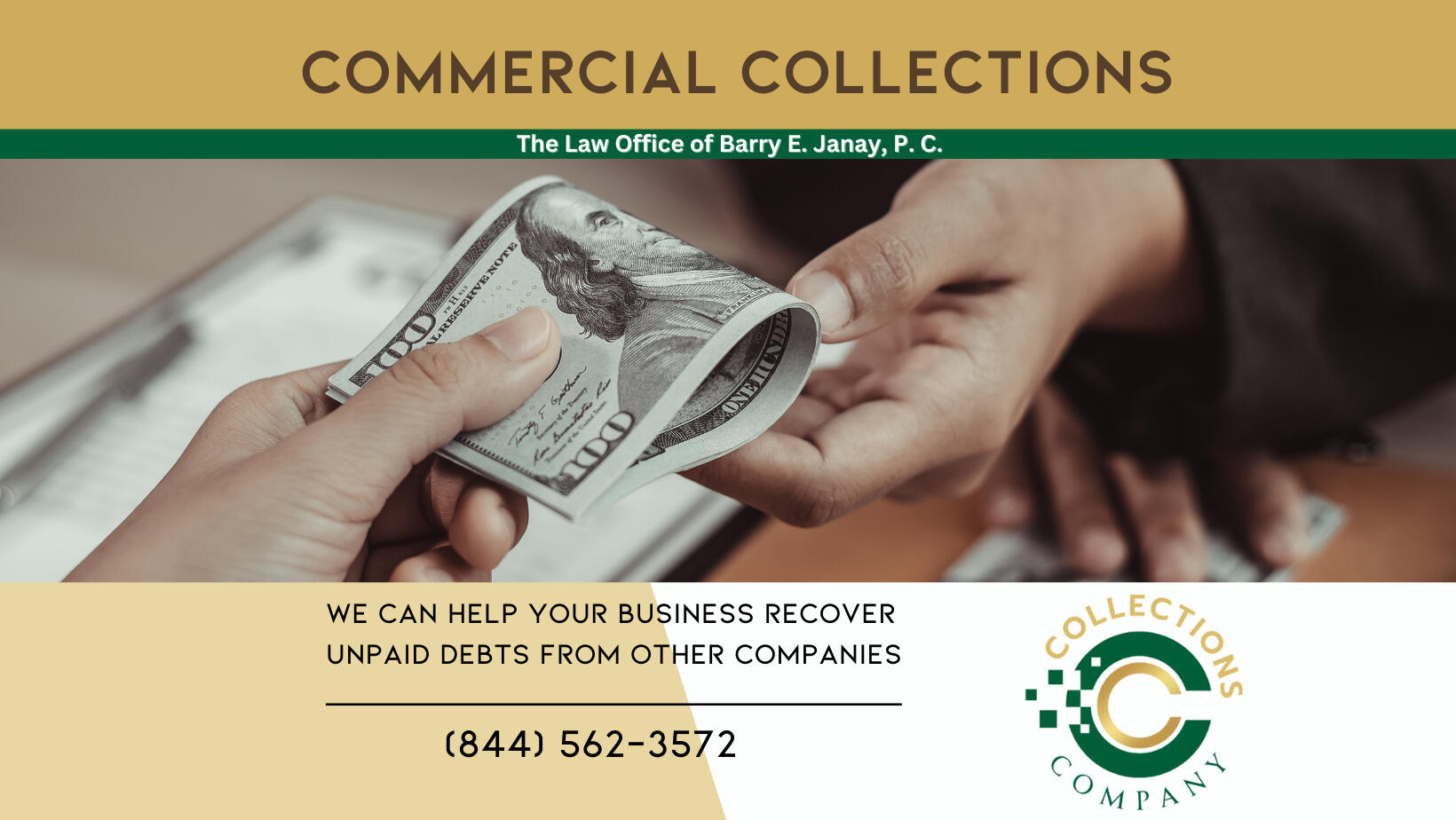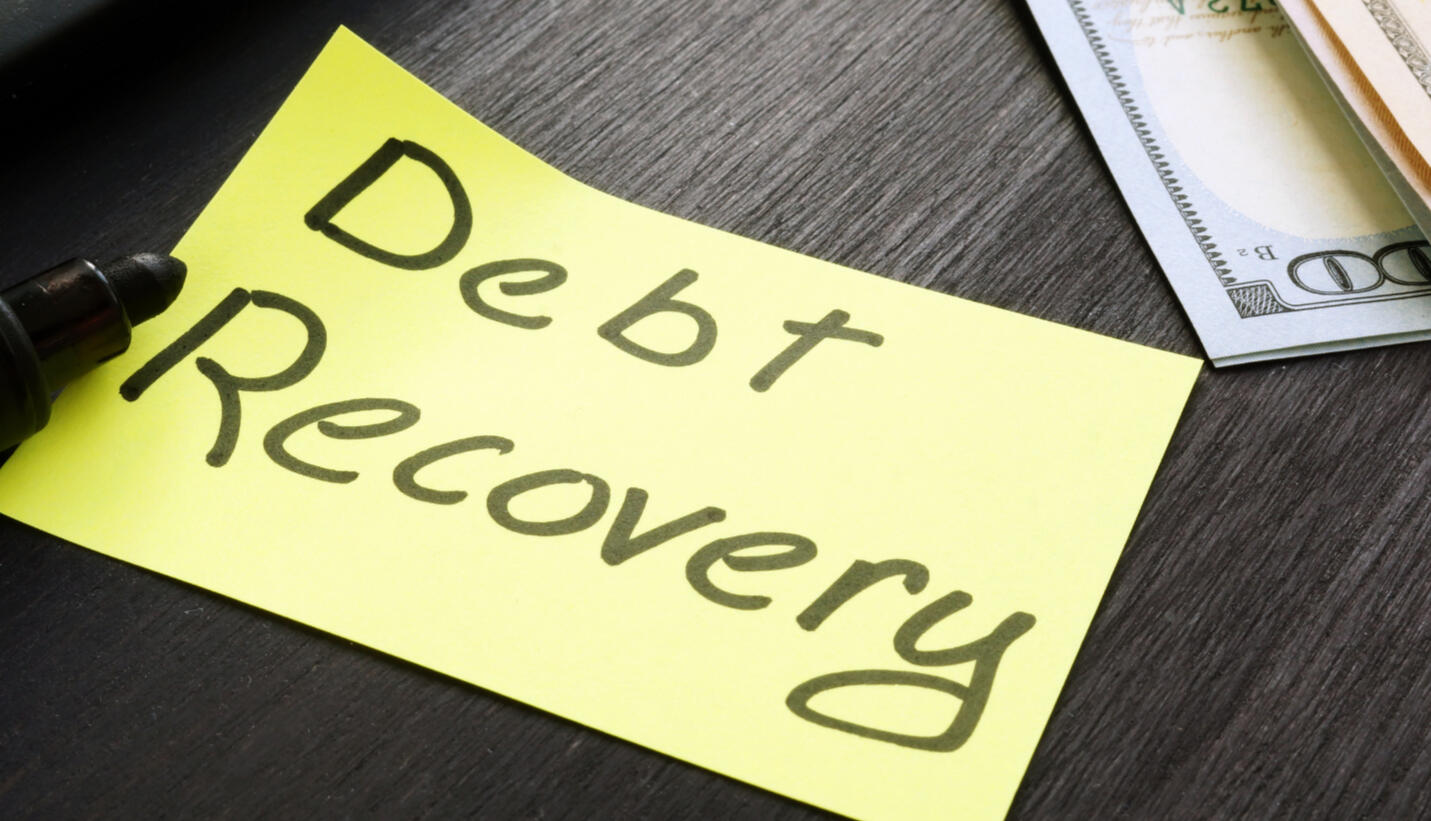
Collections.Company – Aggressive. Relentless. Effective.
You’ve done the work, delivered the goods, and now your customer is refusing to pay… Sometimes these disputes are simple matters and sometimes they are more complex requiring intensive litigation. At The Law Offices of Barry E. Janay, P.C., we can help your business recover unpaid debts from other companies.

The key to successful debt collection and protecting your rights as a creditor lies in timely action. Don't let your legal matters drag on; instead, entrust them to our Collections.Company services, where our team is committed to pursuing the resolution you need.Our Collections.Company services are where your legal needs meet our relentless pursuit of justice. We specialize in Collections Law and creditors' rights, serving both businesses and individuals across New York and New Jersey.With a blend of state-of-the-art techniques and an aggressive approach, our legal experts are dedicated to providing the best possible outcomes for our clients. Your success is our success, and we stop at nothing to ensure you are appropriately compensated.
To start the process, schedule a 15-minute call with one of our experienced attorneys now. Don't delay - your road to resolution begins here.
- What does "collections" refer to in the context of law?
In the legal context, "collections" refers to the process of pursuing payment or recovering debts on behalf of a creditor. It involves taking legal action against individuals or businesses who have failed to fulfill their financial obligations.
- What types of debts can be pursued through collections?
- Collections can involve various types of debts, including unpaid loans, credit card balances, medical bills, utility bills, or any other outstanding financial obligations.
- What steps should be taken before pursuing collections?
- Before initiating collections, it is advisable to exhaust all non-legal means to recover the debt, such as sending demand letters, making phone calls, or negotiating repayment plans. It is also important to review the terms of the debt agreement and ensure the debt is valid and enforceable.
- How can a creditor initiate the collections process?
- The collections process typically begins by filing a lawsuit against the debtor. The creditor must draft a complaint outlining the details of the debt, provide evidence of the debt, and serve the debtor with a copy of the complaint and a summons.
- What happens after a lawsuit is filed?
- Once a lawsuit is filed, the debtor has an opportunity to respond to the complaint. If the debtor fails to respond within the specified time frame, the creditor may seek a default judgment. If the debtor responds, the case proceeds to litigation, and both parties present their arguments and evidence before a judge.
- Are there any legal restrictions or regulations governing collections practices?
- Yes, there are regulations in place to protect debtors from abusive or unfair collections practices. These include the Fair Debt Collection Practices Act (FDCPA) in the United States and similar legislation in other jurisdictions. It is essential for creditors to comply with these regulations to avoid legal repercussions.
- What are the potential outcomes of a collections case?
- If successful, the creditor may obtain a judgment in their favor, entitling them to enforce the debt through various means such as wage garnishment, bank account levies, or property liens. However, the actual recovery of the debt depends on the debtor's financial situation and available assets.
- Can a collections case be settled outside of court?
- Yes, it is possible for the parties to negotiate a settlement agreement, either before or during the litigation process. Settlements may involve a lump-sum payment, a repayment plan, or a reduced amount in exchange for full satisfaction of the debt.
- Should I hire an attorney to handle collections cases?
- While it is not always necessary to hire an attorney, having legal representation can be beneficial, especially if the case is complex or involves significant amounts of money. An attorney can provide guidance, ensure compliance with applicable laws, and represent your interests effectively in court.
- What are the potential costs associated with collections cases?
- Costs may include court filing fees, attorney fees, and expenses related to serving legal documents. In some instances, if the debtor is unable to pay, the creditor may be responsible for bearing these costs. It's important to consider the potential expenses when deciding whether to pursue collections.
- What is your policy on refunds?
- Due to the nature of legal work in general, refunds are approved differently in different situations. For flat fee matters, refunds will not be granted where the attorney has fulfilled a majority of their obligations or undertaken steps to advance your case. Hourly matters are billed against a retainer funded prior to beginning work. There, if the matter is resolved and a balance remains in the retainer, it is refunded without delay. Refunds on other payment structures are evaluated on a case-by-case basis.
The information provided on this website does not and is not intended to, constitute legal advice. Instead, all information, content, and materials available on this site are for general informational purposes only. Information on this website may not constitute the most up-to-date legal or other information.
Collections.Company
©COLLECTIONS.COMPANY All rights reserved. Affiliated with The Law Office of Barry E. Janay, P. C.COLLECTIONS.COMPANY is a trade name of The Law Office of Barry E. Janay, P.C., 354 Eisenhower Parkway, Suite 1250, Livingston, NJ 07039.This page and all other pages and forms (not including external links) on this Website (c) 2023 The Law Office of Barry E. Janay, P.C.